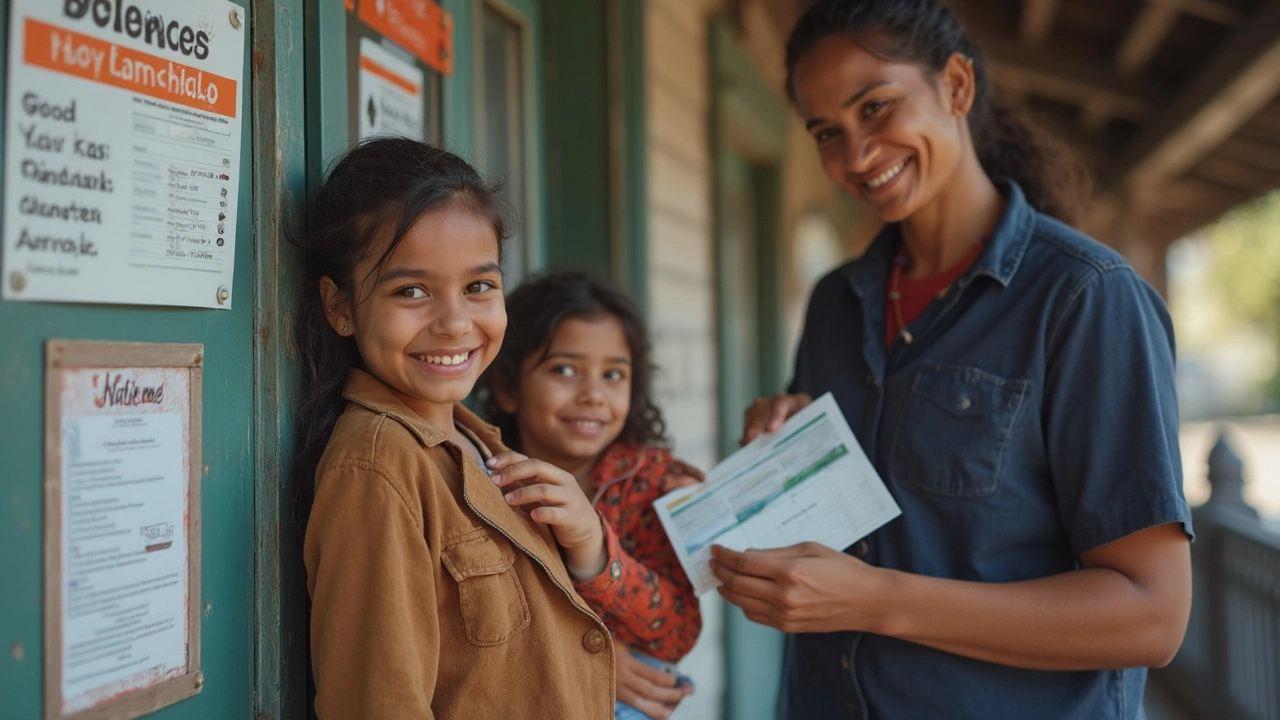How to Get Free Money in Arkansas: Homeless Shelter Resources and Programs
 May, 18 2025
May, 18 2025
Need cash fast while dealing with homelessness in Arkansas? You’re not alone. Every city from Little Rock to Fayetteville has shelters and programs that offer more than just a bed—they can also help you get money for necessities like food, bus rides, medication, and even job search help.
Some shelters partner with organizations that give out small emergency grants—think $50 or $100 at a time—to cover things like IDs, work boots, or a night at a motel if the shelter is full. These programs don’t really advertise, so you have to ask the right staff (usually the case manager or intake worker) about “emergency financial assistance” or “direct support funds.” Be polite but direct.
- Emergency Cash Aid at Shelters
- Special Grants and Assistance Programs
- Help with Food, Transportation, and Essentials
- Where to Apply and What to Expect
- Smart Tips to Get the Most Support
Emergency Cash Aid at Shelters
When you walk through the doors of most Arkansas shelters, you’re not just getting a bed. Many places actually hand out small amounts of cash for emergencies—think replacing an ID, paying for a few nights at a motel, or getting work supplies. But here’s the truth: you usually need to ask for it directly, because shelters rarely advertise this help openly. Staff at the front desk likely won’t know, but a case manager or housing specialist usually does.
In Little Rock, for example, Jericho Way is known for giving out emergency bus passes and sometimes cash help, especially if you have a job lined up or a medical appointment you can’t miss. In Fayetteville, the 7hills Homeless Center gives $10 to $25 grants for prescriptions or basic needs, but you need a quick interview and you may have to show something like a ticket or a receipt.
Shelters usually get the cash for these programs from local churches, city emergency funds, or United Way donations—so what’s available changes month to month.
- Ask for a "flex fund" or "crisis grant." This is shelter-speak for small free payments.
- Have a reason ready—such as needing gas for a job interview, or money to cover a necessary document.
- You’ll almost always have to write your name down and show some kind of ID if you have one.
If you get denied, don’t stop there. Ask if they know of other places nearby giving similar help. Staff often know of pop-up drives, food banks with gift cards, or local churches with their own aid.
| Shelter Name | City | Type of Cash Aid | Typical Amount | Requirements |
|---|---|---|---|---|
| Jericho Way | Little Rock | Bus passes, flex funds | $10-$50 | Job/medical need |
| 7hills Homeless Center | Fayetteville | One-time grants | $10-$25 | Receipt/interview |
| Our House | Little Rock | Emergency family cash | Varies | Children present |
A lot of people think shelters are just about beds and blankets. The reality is, if you’re upfront and know where to ask, you can get real direct cash help—sometimes the same day you ask.
Special Grants and Assistance Programs
If you’re homeless or at risk in Arkansas, there’s actually a web of programs with real money on the table. Don’t just rely on shelter handouts—go after these bigger pots of help. Start with the state’s Emergency Solutions Grant (ESG). These grants, funded by HUD but run through local nonprofits like Our House in Little Rock or 7hills in Fayetteville, cover things like security deposits, short-term rental help, utility debt, even bus passes to job interviews. The catch? You need to meet with a caseworker, share your story, and fill out a quick assessment. Most shelters staff someone who knows how this works.
The Arkansas Department of Human Services also runs the Family Assistance Program, aimed mostly at families and single parents, but they sometimes have emergency money for single adults—especially during bad weather or after natural disasters.
Don’t overlook Catholic Charities and Salvation Army branches. Most people think they just give out food, but many Arkansas locations budget small "prevention grants" of $75–$200 for things like work uniforms, storage lockers, or gas money. You may need to show proof of a job hunt or a recent eviction notice, but ask anyway. In 2024, over 4,300 people statewide got a cash grant, ride voucher, or bill paid through these groups.
- Emergency Solutions Grants from ESG-funded nonprofits (Our House, 7hills, River City Ministry)
- Family Assistance from Arkansas DHS
- Salvation Army Centers (ask for “emergency financial aid”)
- Catholic Charities of Arkansas (apply for “rapid response” help)
Here’s a quick snapshot of how much direct assistance these programs gave out in 2024:
| Program/Group | Average Grant ($) | People Helped (2024) |
|---|---|---|
| Our House | 175 | 1,020 |
| Salvation Army (statewide) | 120 | 2,400 |
| Catholic Charities AR | 95 | 880 |
| 7hills Homeless Center | 110 | 500 |
The bottom line? Don’t wait around. The faster you connect with these programs, the better your shot at snagging some free money in Arkansas that goes beyond shelter basics.

Help with Food, Transportation, and Essentials
When you’re stuck without steady money, getting basics like food and transportation is a real struggle. Good news: Arkansas has a bunch of programs, and most homeless shelters know how to get you signed up fast. Most places will start with a meal—Salvation Army shelters and places like The Van in Little Rock serve hot food most days. And it’s not just meals; you can grab food boxes for the week if you ask at the front desk and have an ID or shelter voucher.
For fresh food, check with local pantries like Arkansas Foodbank (they have over 400 partner agencies). You can use their website to find one near you—some even offer mobile stops that bring food right to the shelter.
| Resource | Service | Where to Find |
|---|---|---|
| Salvation Army | Shelter beds, meals, bus tokens | Statewide, local branches |
| The Van | Mobile meals, hygiene kits | Little Rock area |
| Arkansas Foodbank | Food boxes, produce, canned goods | Statewide locations, use online locator |
Transportation is huge when you need to get to a job interview, a doctor, or just social services. A lot of shelters keep a stash of free bus passes (ask early in the day—they go fast). In bigger towns like Little Rock, try the Central Arkansas Transit “care card” for extended rides. Some smaller towns have churches or agencies that hand out gas vouchers if you have a car but no cash for fuel.
Need essentials like shampoo, socks, or a phone charger? Ask the shelter if they have "hygiene kits." Most get supplies from donations and hand them out, especially to people just arriving. For bigger needs, some local churches hold free “giveaway days” with clothes and bedding—keep an eye on bulletin boards in the shelter for these pop-up events.
- Always ask about what’s available—resources change week to week.
- Bring any forms of ID you have, even expired ones; they help you get help faster.
- Check online shelter lists (like ArHomeless) for emergency needs posted daily.
Don’t be shy about asking for what you need—the staff are used to it, and if they can’t help, they usually know someone who can.
Where to Apply and What to Expect
If you’re looking to actually get free money in Arkansas through homeless shelters or local programs, you need to know exactly where—and how—to start. The top places are community shelters, local nonprofits, and city-run social service offices. The trick is showing up at the right time and asking for the right form of assistance.
Major cities like Little Rock, Fort Smith, Fayetteville, and Pine Bluff each have at least one main shelter or resource center known for connecting folks to emergency funds. Here are some places where you can actually fill out an application or ask for referral:
- Jericho Way Resource Center, Little Rock: They help with bus passes, job search expenses, and sometimes cash cards when funds are available. Always ask for a case manager.
- Seven Hills Homeless Center, Fayetteville: This group connects people to utility help, rent assistance, and limited financial grants—especially for new jobs or surprise medical costs.
- Riverview Hope Campus, Fort Smith: Offers direct links to local churches with emergency relief funds, plus their own grant applications onsite.
Expect to fill out a short intake, show an ID if you have one, and explain what you need the money for. Some programs don’t require ID for small grants (like if you just need help with a bus fare to get to work). Others might ask for proof you’re actively seeking work or connected to services.
The biggest delays usually come from paperwork or limited funding. Shelter programs often refresh their funds at the start of each month, so show up early in the month for the best shot. You usually get an answer in 1–3 days—sometimes on the spot for critical needs like bus tickets or food cards.
| Resource Center | City | Main Support Offered |
|---|---|---|
| Jericho Way | Little Rock | Transport help, food cards, emergency grants |
| Seven Hills | Fayetteville | Utility/rent assistance, job aid grants |
| Riverview Hope | Fort Smith | Church relief funds, on-site grant forms |
So, don’t feel like you have to jump through hoops or be embarrassed asking. Staff at these centers have heard it all, and they’re there to help. Just be honest about your situation, bring any paperwork you’ve got, and follow up if you don’t get an answer the first time. Persistence definitely pays off here.

Smart Tips to Get the Most Support
If you’re in Arkansas and trying to get the most out of shelter and community programs, a few smart moves can make a big difference. Most shelters have strict rules and limited funds, so knowing how to work the system matters.
- Ask Early and Often: Most financial assistance is first-come, first-served—funds usually run out each month. Check in with the intake desk as soon as new funds become available, usually at the start of the month or right after a big community donation.
- Know What to Say: When asking, use the right lingo—mention you’re seeking “emergency cash assistance,” “relocation support,” or “work-related expense help.” This shows staff you know what’s available.
- Have Documents Ready: If you have any paperwork—like an old ID, Social Security card, or medical paper—bring it. Shelters in Arkansas give priority to people with any kind of ID.
- Double-Dip (Legally!): You can usually apply to more than one help program. Lots of folks get support from churches, then go to a different pantry or shelter on another day. Just don’t fake your name; shelters often share info with each other.
- Look for Bonus Help: Ask about how to get cell phone minutes, bus passes, or fast-tracked job help. Some local groups sneak these in when you get aid, especially in Little Rock and North Little Rock.
Let’s look at what’s often available month-to-month:
| Type of Assistance | Typical Amount | Where to Ask |
|---|---|---|
| Emergency Cash Grants | $50–$150 | Main shelters, some Salvation Army locations |
| Food Vouchers | $25–$40 groceries or meals | Food banks, Catholic Charities, large churches |
| Transportation Passes | 1 week–1 month of rides | CANVAS in Fayetteville, Our House in Little Rock |
| ID Assistance | Full cost of ID | Arkansas Workforce Center, Jericho Way |
If you’re new or moving between places, don’t be shy about asking others in the shelter for advice. Folks with experience often know the quickest ways to get free money in Arkansas and will even tip you off about which staff members are the most helpful. Help is just as much about who you know as what you know.